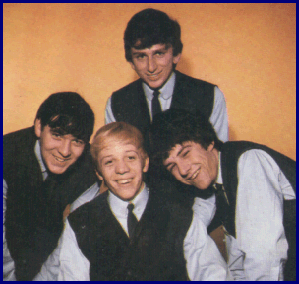Main Page
Index of Artists
The Pack
Paddy, Klaus & Gibson
The Bobby Patrick Big Six
Peter & Gordon
Pinkerton's Assorted Colours
The Poets
Brian Poole & The Tremeloes
Jimmy Powell & The Five Dimensions
Keith Powell & The Valets
Earl Preston & The TT's
The Pretty Things
The Alan Price Set
P. J. Proby

Gary Brooker - keyboards/vocals (born May 29th 1945, Hackney, London)
Robin Trower - guitar (born March 9th 1945, Catford, London))
Chris Copping bass guitar until 1962 (born August 29th 1945, Middleton, Lancashire)
Graham "Diz" Derrick - bass guitar
B.J. Wilson - drums (born March 18th 1947, Edmonton, London, Died 1990, Oregon)
The group formed in 1959 when Brooker, Trower and Copping were still at school in Southend, Essex. A band contest was held at the Palace Hotel Dancehall in Southend and the organiser had the idea of taking the best members of the competing groups and putting them together in one band. The first line-up featured Brooker, Trower and Copping with Bob Scott on vocals and Mick Brownlee on drums. Brooker was soon forced to take over as vocalist after Scott failed to turn up for one of their gigs.
They turned professional in '62 and moved to London to seek their fortune. By this time both Copping and Brownlee had exited the band and been replaced by Derrick and Wilson respectively. Signed to Parlophone in 1963 and under the guidance of producer Ron Richards, The Paramounts released several R&B singles but only their debut, a cover of The Coasters' "Poison Ivy", made any impression on the charts.
To promote "Poison Ivy", they made appearances on television shows "Ready, Steady, Go" and "Thank Your Lucky Stars". They shared the bill of the second of these shows with the Rolling Stones who were so impressed with the Paramounts that they labelled them "the best r&b band in England".
They gradually built up a following as a live act and were added to Brian Epstein's NEMS stable in 1965 and even appeared on tour with The Beatles. None of this, however, had much impact on the sales of their records and they were reduced to backing artists like Sandie Shaw.
Disillusioned with having to play as a back-up band to various solo singers, the group disbanded in September 1966 only to find themselves re-grouping under the guise of Procol Harum (but that's another story!).
Singles
|
Dec '63 |
Poison Ivy/ I Feel Good All Over |
Parlophone R 5093 |
UK#35 |
|
Feb '64 |
Little Bitty Pretty One/ A Certain Girl |
Parlophone R 5107 |
- |
|
Jun '64 |
I'm The One Who Loves You/ It Won't Be Long |
Parlophone R 5155 |
- |
|
Oct '64 |
Bad Blood/ Do I |
Parlophone R 5187 |
- |
|
Apr '65 |
Blue Ribbons/ Cuttin' In |
Parlophone R 5272 |
- |
|
Oct '65 |
You Never Had It So Good/ Don't Ya Like My Love |
Parlophone R 5351 |
- |
E.P.
|
Mar '64 |
The Paramounts - Little Bitty Pretty One/A Certain Girl/Poison Ivy/I Feel Good All OverParlophone GEP 8908 |
Re-issue
|
1998 |
Abbey Road Decade 1963-70 - Poison Ivy/I Feel Good All Over/Bad Blood/Chills And Fever/Little Bitty Pretty One/A Certain Girl/Stupidity/It Won't Be Long/Pride And Joy/Do I/I'm The One Who Loves You/Hey Little Girl/You've Got What I Want/Turn On Your Lovelight/Blue Ribbons (No Strings)/Blue Ribbons/Cuttin' In/Baby I'm Yours/Don't Ya Like My Love/Draw Me Closer/You Never Had It So Good/Freedom/Kansas City/Breathless/Brand New Cadillac/Matchbox/Shopping For Clothes/The Girl Can't Help It |
For more on The Paramounts visit
"Beyond the Pale"